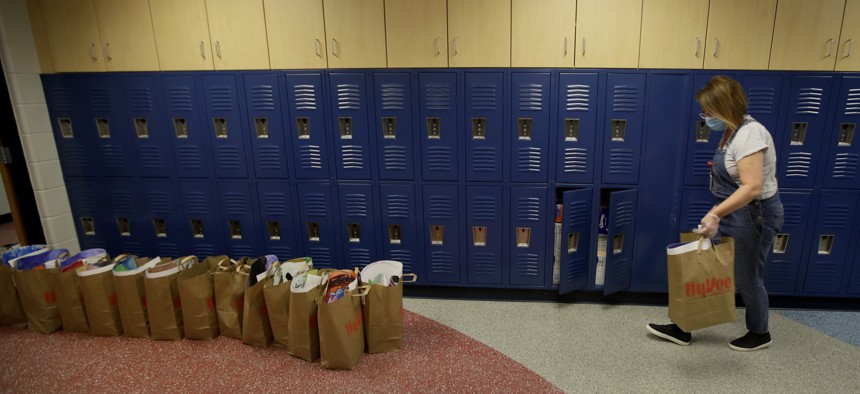Connecting state and local government leaders
Districts that can largely support themselves with local tax dollars are in a better position as the economic downturn continues.
As the coronavirus-driven slowdown pummels state budgets, the education funding gains many school districts saw in recent years—or were about to see—are in peril.
In Hawaii, where public schools are run by the state, the governor has proposed a 20% cut in teacher pay starting next month. Kansas lawmakers are likely to suggest education cuts to close a $650 million budget gap just a year after the state resolved a decade-long lawsuit over insufficient school spending. Wichita Public Schools, the state’s biggest district, has already approved $18 million in budget cuts, while projecting a total budget hit of nearly twice that amount.
But, as it has with other facets of life and policy, the Covid-19 slowdown is affecting school districts differently. In Boston, public schools actually expect a $26 million spending boost for the upcoming school year. In Montgomery County, Maryland, County Executive Marc Elrich is contemplating raising taxes to pay for staffing increases, primarily for public schools.
The difference largely has to do with how much a school district relies on financial support from states, which are seeing declining income and sales tax revenues create massive budget holes. Montgomery County Public Schools depends on the state for less than a third of its budget, according to National Center for Education Statistics data analyzed by Georgetown University’s Edunomics Lab. In Boston, public schools count on Massachusetts for less than 10% of operating costs. Meanwhile, Hawaii Public Schools are funded almost entirely by the state and Wichita Public Schools rely on Kansas for about two-thirds of its funding.
All this means that schools districts paying for operations mostly from local revenue won’t see as much of an immediate budget impact from Covid-19, says Edunomics Lab Director Marguerite Roza.
“But if you’re heavily reliant on the state...they might very well reduce payments to districts,” she says. “And in doing that, if they don’t take close care to rethink the funding formula, they could be creating a disproportionate impact between districts.”
Essentially, the school districts least able to sustain cuts could end up getting hit the worst. In Ohio, for example, Gov. Mike DeWine has ordered a cut of $300 million in state school funding the remainder of the fiscal year, which ends there on June 30. But his plan calls for targeting those cuts in the wealthiest districts.
The whole reason some places are more reliant on state money is to help balance out inequities created by the fact that property taxes are the primary source of local revenues for schools. But in a recession, that state support can topple. Meanwhile, property tax revenue tends to be stable and not subject to the sudden economic swings that hit sales taxes and income taxes—states’ primary sources of revenue.
Boston is an example of these factors in the extreme. Not only does it rely on the state for just 6% of its funding, nearly $3 out of every $4 the city takes in comes from property taxes. That’s made for a relatively stable budget, even during recessions. Much of the district’s increased budget for the next school year is due to Mayor Marty Walsh’s decision to go ahead with a promised $80 million spending boost to public schools. Still, notes budget director Justin Sterritt, the city has done so by pulling back other spending increases. “Instead of being ambitious in all areas it's become very focused on housing and education,” he says.
Elsewhere, states that have built up rainy day funds may be able to stave off education cuts for now. Wyoming, which the Pew Charitable Trusts says has the most robust rainy day fund of any state, has kept its education budget whole so far. Kansas, where state leaders are already weighing cuts, has essentially no emergency reserves.
“This is a situation where that conservative fiscal planning is going to pay off,” says Tom Kozlik, head of strategy and credit at Hilltop Securities. “[School districts] in other states that haven’t done that, in those situations you could very well could see more cuts.”
Many districts are making estimates on how their budgets might shrink, but are still waiting on whether federal aid will help fill some of the gaps. The CARES Act passed in March did include nearly $31 billion to an Education Stabilization Fund distributed through the states. Localities and districts are now applying, but the money can only be spent on Covid-19-related expenses and can’t be used to fill revenue gaps. So, while schools are looking at using the money to close learning gaps over the summer and help expand distance learning, it won’t save any teachers from layoffs.
More than 60 superintendents are now calling on Congress to approve more federal assistance that would help them avoid massive budget cuts. In a letter sent late last month, they ask for an additional $175 billion for the Educational Stabilization Fund and a total of $27 billion in other support.
The letter noted that several large districts are now projecting up to a 25% revenue loss in the upcoming school year, warning “dark clouds are forming on the educational horizon that will spell disaster if Congress does not intervene.”
Liz Farmer is a journalist and fiscal policy expert who often writes about budgets, fiscal distress, and tax policy. She is currently a research fellow at the Rockefeller Institute’s Future of Labor Research Center.

NEXT STORY: Smaller Cities Left Waiting on Coronavirus Aid Money



